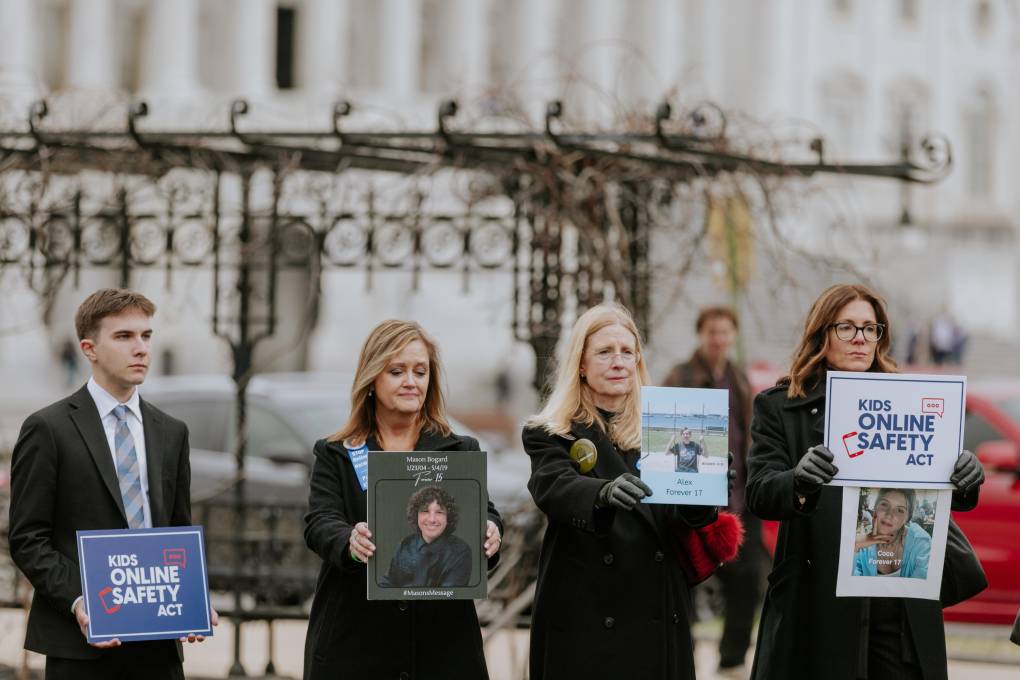The legislation passed the Senate with strong bipartisan support earlier this week, and the measure now heads to the Republican-led House.
New law will require companies to limit harmful content
The last time Congress passed a law to protect children on the internet was in 1998 — before Facebook, Instagram, Snapchat and smartphones. The legislation would require tech companies to implement measures to help protect kids from exposure to harmful content.
For example, companies would be prohibited from using algorithms to push content that underage users did not specifically search for. This addresses a huge concern of parents and advocates: that kids are targeted with content that promotes harmful behavior, such as eating disorders, sexual exploitation and substance abuse.
The bill would also raise the maximum age of children covered under the law to 17; ban companies from collecting data from minors, including biometric indicators such as fingerprints, voiceprints and facial imagery; and improve parental controls.
Josh Golin is the executive director of Fairplay, a nonprofit working to protect kids from marketing and dangerous online content from Big Tech.
“For the first time ever, social media and other online platforms will have a legal responsibility to consider how they are impacting children,” Golin says.
Golin says it’s important for online platforms and members of Congress to recognize that regulating the use of social media for their kids has become overwhelming for families.
No parent is looking for “another full-time job,” he says.
“We need to put the responsibility back on where it belongs, which is on these companies who are the ones controlling what these kids are seeing. We need to ensure that these kids are not being sent down such dangerous rabbit holes,” says Golin.
Advocates hope new law will help fight cyberbullying
Parent advocates of the bill say the new requirements will make it easier to protect their kids from becoming victims of cyberbullying. They say more parent-friendly user settings will make it easier to control what their kids are exposed to online.
Kristin Bride says the anonymous messaging feature on Snapchat ultimately led to her son’s death.
“I absolutely believe that my son would be alive if this legislation was in place at the time,” she says.
While cyberbullying is not directly called out in the legislation, its impacts — anxiety, depression, suicidal and self-harming behaviors — are addressed, says Vaishnavi J., founder of Vyanams Strategies, an organization that advises companies on how to create safer tech products for children.
“Cyberbullying is a really challenging issue to navigate because it’s so coded and it’s constantly evolving,” says J.
J. notes that cyberbullying disproportionately impacts girls and young women of color.
“They are typically under-represented from marginalized communities. They aren’t getting the range of societal support they deserve,” J. says. “That tends to extend to online as well.”
J. also says boys are under-represented in the research when it comes to cyberbullying, something that she says isn’t talked about enough.
Boys “don’t tend to tell you that they’re being harassed or bullied. Instead, they choose to suffer in silence … and that’s a real problem,” she says.
All 50 states have laws against bullying, and every state — except Wisconsin and Alaska — include specific references to cyberbullying. Currently, there are no federal laws that criminalize cyberbullying.
More challenges lie ahead
Along with the safety bill, the Senate also passed online privacy legislation that would prohibit online companies from collecting personal information from kids under the age of 17 without their consent.
Even though the online safety bill has broad bipartisan support, some lawmakers argue that the legislation could violate free speech rights. Others are concerned that the new regulations could prevent some kids from accessing information on LGBTQ+ issues or reproductive rights.
Social media companies including Microsoft, X and Snapchat have voiced support for the measure, while TikTok and Meta have called it unconstitutional.

Senate Majority Leader Chuck Schumer says there’s still more work to be done to regulate online protections for kids, but the new online safety law would be a step in the right direction. The bill now heads to the Republican-led House where Speaker Mike Johnson has signaled support for the legislation.
Maurine Molak is among the families who worked with the Senate to get the bill passed. She lost her 16-year-old son, David, to suicide after months of relentless online threats and cyberbullying. Molak is urging every House member to vote in favor of what she says is a game-changing bill.
“It’s game-changing for young people. It’s game-changing for families,” she says. “I hear it over and over again that it’s like a game of Whac-A-Mole. As soon as parents figure out to keep their kids safe on one platform — three more pop up.”
